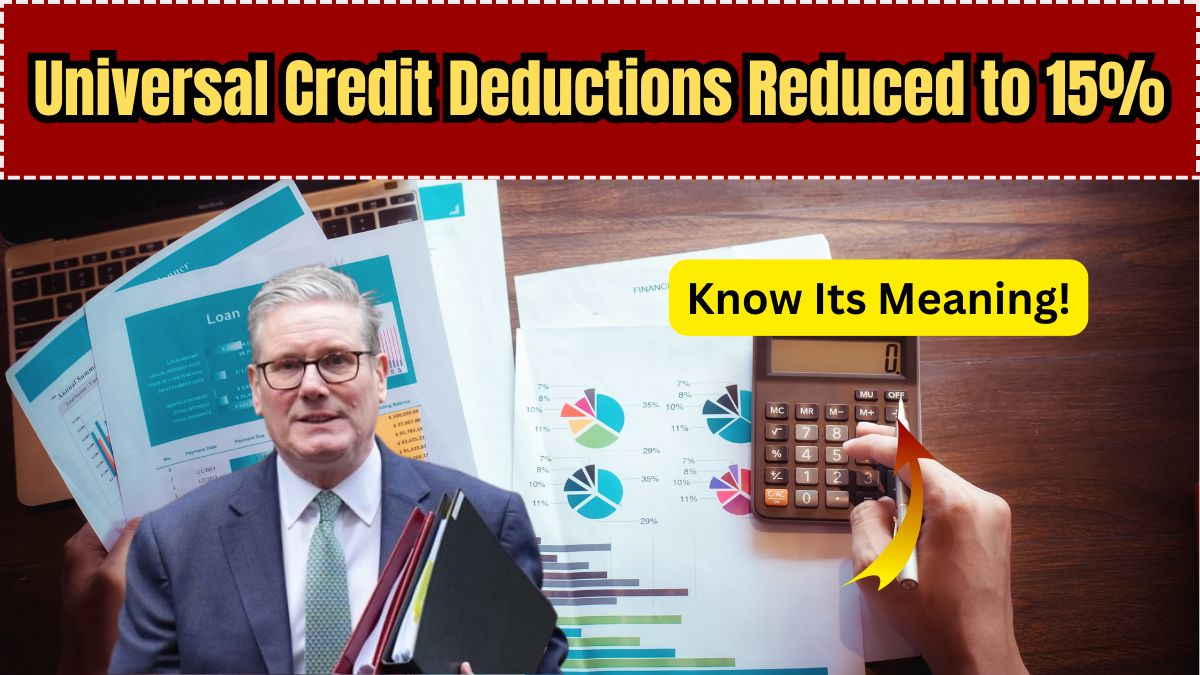In a significant move to ease financial pressure on struggling households, the UK government has reduced the cap on Universal Credit deductions from 25% to 15%, effective May 2025. This change impacts over 1.2 million recipients who had previously seen a quarter of their benefit income deducted to repay debts.
This reduction is part of a broader reform by the Department for Work and Pensions (DWP) aimed at ensuring fair repayment rates while maintaining dignity for low-income families. The measure is expected to bring substantial relief by increasing disposable income for affected households.

What Are Universal Credit Deductions?
Universal Credit recipients often face deductions from their monthly payments to repay advance loans, benefit overpayments, rent arrears, or other debts. Previously, the maximum deduction rate was set at 25% of the standard allowance, which many campaigners argued was too high.
Starting from May 2025, Universal Credit 2025 reforms have reduced this limit to 15%, aligning with a more sustainable repayment model and helping families keep more of their benefits.
Key Highlights:
-
New deduction cap set at 15% of standard Universal Credit allowance
-
Over 1.2 million claimants positively affected
-
Applies to deductions for advance repayments, third-party debts, and overpayments
-
Managed by DWP Updates under revised debt recovery policy
How This Change Affects Your Benefits
Under the new cap, claimants will see a smaller portion of their Universal Credit withheld, allowing for more flexibility in covering essentials like food, utilities, and housing. For a single claimant aged over 25 receiving £393.45 per month, the change means a deduction of no more than £59.02, instead of up to £98.36 under the previous cap.
This move strengthens the government’s commitment to UK welfare changes that focus on long-term support rather than short-term debt recovery.
Example– Impact on Standard Allowance
| Category | Monthly Allowance | 25% Deduction (Old) | 15% Deduction (New) |
|---|---|---|---|
| Single claimant (over 25) | £393.45 | £98.36 | £59.02 |
| Couple (over 25) | £617.60 | £154.40 | £92.64 |
What Deductions Are Affected?
The DWP Updates confirm that the reduced cap covers:
-
Advance repayments
-
Third-party debts (like rent arrears and energy bills)
-
Benefit overpayments
-
Court fines
This cap applies to the total deductions, not per category. So the 15% limit is shared among all deductions in a payment cycle.
Why This Change Matters
Debt deductions have long been criticized for pushing vulnerable families further into poverty. The Universal Credit 2025 reform aims to reverse that. According to government estimates, this new cap will result in an additional £150–£300 per year in disposable income for many claimants, allowing them to budget more effectively and reduce reliance on food banks or crisis loans.
FAQs
What is the new Universal Credit deduction cap?
The deduction cap has been reduced from 25% to 15% of the standard allowance as part of the Universal Credit 2025 reform.
Who benefits from this change?
Over 1.2 million claimants currently having deductions from their Universal Credit payments will benefit from lower deduction rates.
Does this affect all types of deductions?
Yes, the 15% cap applies to all combined deductions including advances, overpayments, and third-party debts.
Is this change automatic?
Yes, the DWP Updates confirm that the adjustment will be applied automatically to eligible claims starting May 2025.
Click here to know more.



